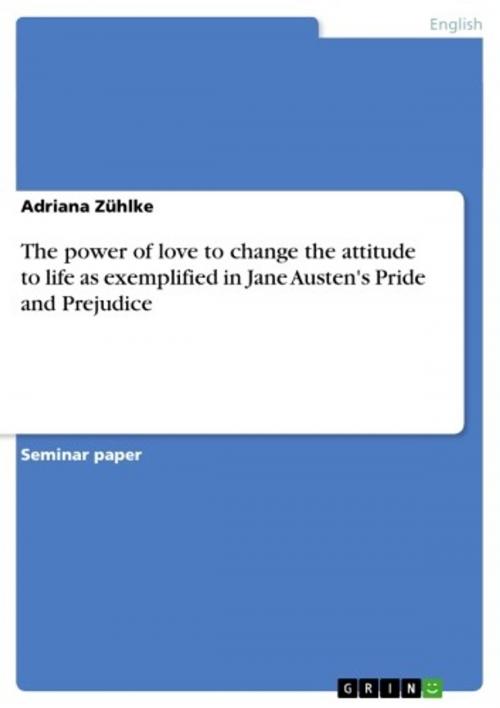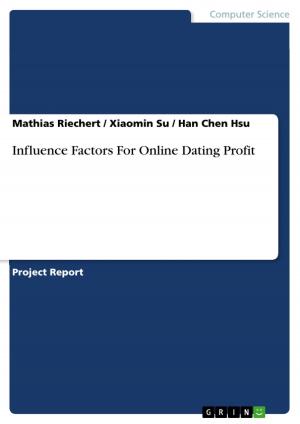The power of love to change the attitude to life as exemplified in Jane Austen's Pride and Prejudice
Fiction & Literature, Literary Theory & Criticism, British| Author: | Adriana Zühlke | ISBN: | 9783638260381 |
| Publisher: | GRIN Publishing | Publication: | March 11, 2004 |
| Imprint: | GRIN Publishing | Language: | English |
| Author: | Adriana Zühlke |
| ISBN: | 9783638260381 |
| Publisher: | GRIN Publishing |
| Publication: | March 11, 2004 |
| Imprint: | GRIN Publishing |
| Language: | English |
Seminar paper from the year 2004 in the subject English Language and Literature Studies - Literature, grade: 1 (A), University of Szczecin (Institute for English Studies), 23 entries in the bibliography, language: English, abstract: Jane Austen's novel 'Pride and Prejudice' was initially titled 'First Impressions', which already indicates the book's reference to the weight of appearance and its impact on the development of relationships, opinions and even a person's whole life. In fact, the book's main action, which focuses on the destiny of Elizabeth Bennet and Mr. Darcy, is based on first impressions, namely those the characters get at the Meryton assembly. When Darcy enters the room he is commonly regarded as fine, handsome and in possession of a noble mien1 - a positive assessment which the party even improves after learning that Darcy is a wealthy man: 'The gentlemen pronounce him to be a fine figure of a man, the ladies declared he was much handsomer than Mr. Bingley, and he was looked at with great admiration (...)'2. Nevertheless, soon a certain aversion towards Mr. Darcy develops since he is discovered to be 'the proudest and most disagreeable man in the world'3. Here, Austen provides a typical example of how the people of her time judged and how 'first impressions' can be influenced by social and economic status. Therefore, the people's opinions and perspectives were not likely to be objective but rather collectively biased and ignorant - one of Austen's main points of criticism in her comedy of manners. As a consequence, Elizabeth's and Darcy's (re-)actions are influenced by the common etiquette as well, for the y are both respected members of society and take part in social life with all its rules and customs. 1 Compare: Austen, Jane: Pride and Prejudice, London: Penguin Popular Classics, 1994, 10 2 Ibid. 3 Austen, 11
Seminar paper from the year 2004 in the subject English Language and Literature Studies - Literature, grade: 1 (A), University of Szczecin (Institute for English Studies), 23 entries in the bibliography, language: English, abstract: Jane Austen's novel 'Pride and Prejudice' was initially titled 'First Impressions', which already indicates the book's reference to the weight of appearance and its impact on the development of relationships, opinions and even a person's whole life. In fact, the book's main action, which focuses on the destiny of Elizabeth Bennet and Mr. Darcy, is based on first impressions, namely those the characters get at the Meryton assembly. When Darcy enters the room he is commonly regarded as fine, handsome and in possession of a noble mien1 - a positive assessment which the party even improves after learning that Darcy is a wealthy man: 'The gentlemen pronounce him to be a fine figure of a man, the ladies declared he was much handsomer than Mr. Bingley, and he was looked at with great admiration (...)'2. Nevertheless, soon a certain aversion towards Mr. Darcy develops since he is discovered to be 'the proudest and most disagreeable man in the world'3. Here, Austen provides a typical example of how the people of her time judged and how 'first impressions' can be influenced by social and economic status. Therefore, the people's opinions and perspectives were not likely to be objective but rather collectively biased and ignorant - one of Austen's main points of criticism in her comedy of manners. As a consequence, Elizabeth's and Darcy's (re-)actions are influenced by the common etiquette as well, for the y are both respected members of society and take part in social life with all its rules and customs. 1 Compare: Austen, Jane: Pride and Prejudice, London: Penguin Popular Classics, 1994, 10 2 Ibid. 3 Austen, 11















